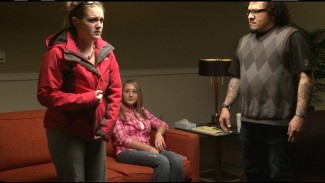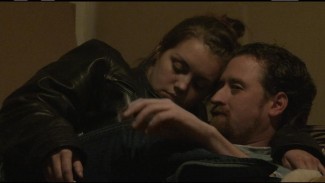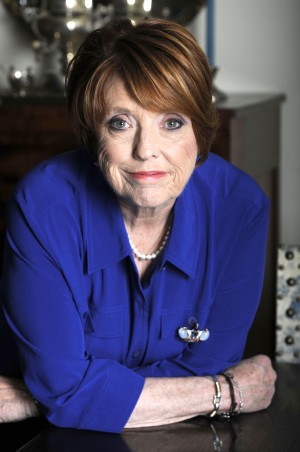Candy Finnigan on the final episodes of ‘Intervention’

When Candy Finnigan walks into a room, the sound of jaws hitting the ground can often be heard. She’s a no-nonsene interventionist who has helped save countless lives, many of them featured on A&E’s successful reality series Intervention.
A recovering alcoholic herself, Finnigan can be seen on the series sitting down with families and letting them know the intricacies of their loved one’s disease. In many ways, she’s the last line of defense between an addict and the coffin.
For 23 years, she’s passed on vital information to help people out of the darkness. “I myself am in recovery, so I don’t think I really realized how much of a family disease it was until I got involved in the whole process myself,” Finnigan said recently during a phone interview. “As far as the show, jokingly I’ve always said, I signed up to do the show because I never believed it would go.”
She signed up for Intervention several years ago, and the rest has been reality-TV history. The show has been a hallmark series for A&E, and there’s only four more episodes remaining (airing Thursdays at 9 p.m.)

“When the show was created and Sam Mettler [creator and executive producer] called me, I went, ‘Sure, I’ll come over and interview with you. Sure, that’s a great idea.’ Then I thought to myself, these people are crazy. But as somebody more powerful than me certainly had in mind … I think the show went on the air, and I know over 260,000 families applied to be on that show. And that’s a whole lot of people. A quarter of a million people were going to swallow all of their secrets and all of their shame to … publicly address their own family’s problems and addiction and alcohol.”
Finnigan admitted to being moved by families coming forward to have their personal secrets be open to public scrutiny. Because the show follows one addict per episode, most of the quarter of a million did not receive a televised intervention. But Finnigan said she hopes that Intervention has touched more lives than the subjects featured on the series.
“I’m not in the entertainment business,” she said. “But I have to tell you I don’t think I’ve even gotten a definitive answer why the show was canceled other than I guess it would have to be numbers. But am I sad it’s over? You know, I’m so sad it’s over.”
In a few weeks, Finnigan will only have the memories from the series, and those recollections are numerous. She is often stopped in public and thanked by addicts. The ending of the show is the ending of what Finnigan said is a truly “authentic” TV series.
“I’ve never known anybody to tell somebody what to say,” she said. “I’ve never known one cent of money to cross the palm of anybody. The only thing this show offers them is an intervention and treatment for 90 days and a follow-up. And I don’t think most people that aren’t addicts or part of a family believes the show. I mean I have people all the time going, ‘Come on. You know, come on.’ And I go, ‘Never have I ever seen anything as ethical as this show, and with such heart.’ And the people that worked on the crew, and the people that were behind the scenes, and even A&E, I think this show has been such a true success because none of us has ever compromised our values.”
For Finnigan, it seems like Intervention is much more than an opportunity for TV time. She is a firm believer that addiction is a disease that kills and there’s always hope of rescuing a person. After all, she herself is the product of recovery. Finnigan said her family was so fooled that they didn’t know she was an alcoholic, so she can identify with the subjects on Intervention, all of whom go through a vigorous screening process.

“When we first started, Sam Mettler would not let anybody know how he was getting families to even apply, and the applying process to get on that show is not you write a letter and say, ‘My son’s a junkie, and my God, we don’t know what to do. And he’s going to die.’ That’s the first part. Then it has to go through this incredible kind of interrogation board. … Then they have to send in a video of the person to make sure that this person is real.”
The process can take months, a period of time Finnigan found stressful because the family had to keep the addict alive. “And most of these people were so incredibly sick that I thought, what a responsibility,” she said. “But I think they just didn’t know what to do, and I don’t think it was the poorest of the poor, or the rich. I think that what it really was was that they just watched the show and saw that there was hope.”
The impetus for the addict to be filmed, in Finnigan’s mind, is that he or she does not want anyone else living such a life. She called them self-centered, but in pain, and knowing that the suffering is too much to bear.
Within the application process, the producers looked for possible fakes. There is a devotion to ensuring the on-screen intervention is actually an intervention, a word that’s come to mean when a family or group of friends confronts a loved one about a serious health issue.
“Maybe one time in the beginning they got kind of fooled until they started to pack up to go to the location, and they found out that this woman just really wanted her son’s art to be seen,” Finnigan said of one example. “The people that answered the phone and all of the executives and the crew members, they started getting pretty savvy about all this because, needless to say, they never talked or met the addict until they went on location. And so if for any reason — any reason — they suspected or knew that the addict/alcoholic had any idea that we were the show Intervention … packed up and gone with no explanation sometimes.”
One time, a girl in Texas told a pharmacist that she needed “10 more pills” because she was on Intervention. Finnigan said the production team went back to the hotel, packed up and left. “Because that was the contract that they signed,” she said. “This will be a true intervention. This isn’t going to be something that’s staged. … I was never involved in any intervention on that show where the addict/alcoholic knew it was Intervention.”

With more than two decades of work in this field, Finnigan said she has not had an unsuccessful intervention. She focuses her efforts on the pre-intervention with the family, in order to improve the dynamic of the loved ones.
“There’s not going to be anymore enabling. There’s going to be no more whispers, no more lies. There’s always the secret-keeper who sneaks the person money or doesn’t tell everybody the truth that they got another DWI. You know, whatever it is. And, you know, I feel deeply that every intervention I’ve ever been involved in, either on the show or personally, has changed the dynamic of this family who has been living with this terminally ill person. And, you know, sometimes it’s really difficult. And it isn’t always successful to have people keep to their consequences, that if they choose not to go into recovery that day that there will be consequences.”
Finnigan said she believes in surprising the addict. There can be no preparation for such revelations. “It’s like I always said, you can’t invite somebody to their own hanging and remind them to bring their own rope,” she added. “Now there is a process called the systemic intervention, and it’s an invitation where the whole family is involved in different counseling, I guess you would say for a couple of days. And the end product is not necessarily trying to get the person to treatment. It’s having the family be cohesive and back together. And I’ve been trained in it. I went through it twice, and I’m just not that girl. I’m not that interventionist. I’m a crisis interventionist.”
Changing the family dynamic can be difficult, especially when enabling an addict is seen as a form of love. “[Y]ou sit a family down and you hear the sister go, ‘Well, you know, I went and picked him up. I know I wasn’t supposed to, but I went and picked him up and took him home. And got him a bottle of Jack Daniel’s because, you know, I didn’t want him to go out.’ And somebody else would say, ‘Well, I gave him $20 a day because to go out and score heroin because I didn’t want him to rob anybody.’”
Finnigan said family members make these decisions because they don’t want their loved ones to die. But it’s up to the interventionist to make sure everybody is able and willing to hold the addict to strict rules. Seek help, and no longer expect enablement. “With my interventions, I have everything figured out, every ‘I’ dotted and ever ‘T’ crossed,” she said. “And then I allow them the privilege to intervene on this person. I’m not intervening on them, the family is. My job is really to get them prepared to do this intervention.”
With her leadership comes the reality that Finnigan is an alcoholic in recovery herself, giving her a sense of credibility in the “recovery business.” The interventionist added that she still attends 12-step meetings and has some “definitive behaviors” associated with alcoholism and addiction. “And if I’m not going to meetings and I’m not helping another alcoholic, I have to tell you, those behaviors sneak right in with me,” she said. “More than once, I’ve had my husband said, ‘It’s time to go to a meeting.’”
When a particular case study involves a mother and child, Finnigan is reminded of her own struggles. But she doesn’t include her story in the pain of other addicts. “Then it’s about me and not about them,” she said. “Do I remember when somebody says, ‘You know, you put your kids to bed and then you started drinking.’ Absolutely. And I say to the family, ‘I’ve done that.’ I know that. I know that helpless feeling that no matter what I’ve said to myself, promised myself that I wasn’t going to take a drink that day, and then it hit 8 o’clock, and my kids were asleep, and I was looking at myself in the mirror. I had no choice but to pick up a drink because it was my medicine. You know it was the thing that brought me such comfort. And it was my little secret.”
Now Finnigan can look back on her years with A&E’s Intervention knowing that her little secret and the secrets of so many others have been broadcast with the intention of putting a real face on the disease of addiction. She hopes the inspiration continues after the final episodes air.
“I’m just really, really hoping that millions and trillions of people will watch these last five episodes and so that maybe, I know I’m never guaranteed that A&E would bring it back, but that they would rethink that this is a really worthwhile show that actually helps a lot of people, probably many, many more than we’ll ever know.”
By John Soltes / Publisher / John@HollywoodSoapbox.com
-
Intervention continues on Thursdays at 9 p.m. on A&E.


6 thoughts on “Candy Finnigan on the final episodes of ‘Intervention’”